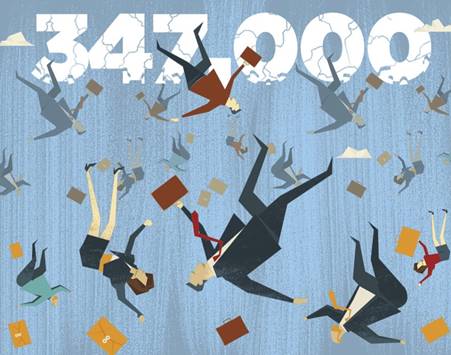26 de septiembre 2018

Ortega Grants Chinese Company a Huge Mining Concession

PUBLICIDAD 1M
PUBLICIDAD 4D
PUBLICIDAD 5D
Says Juan Sebastian Chamorro, the director of the Nicaraguan Foundation for Economic and Social Development.

Funides calculates that the recession has resulted in the loss of 347,000 jobs. Illustration: Juan Garcia
The sociopolitical crisis in Nicaragua over these past five months hasn’t only inflicted a fatal toll on human rights, but it has also hit the economy very hard. It’s been estimated that 347,000 people have been dismissed from their jobs, and losses ascend to some US $946.2 million.
Those are the calculations of the Nicaraguan Foundation for Economic and Social Development (Funides), whose most recent study points to an economy that will close this year with a negative growth that oscillates between -2.1% and -4%. The panorama for 2019 isn’t encouraging either.
Juan Sebastian Chamorro, executive director of Funides and a delegate to the Civic Alliance for the business sector, warns that while no solution is found to the political crisis, “we’re heading towards an economic cliff.”
“The solution to the economic problem has its roots in the political problem. If no solution is found for the original problem – the political one – we’re going to continue with no [economic] solutions,” Chamorro assured.
The economic recession has caused the loss of 347,000 jobs: 154,000 in the commercial sector; 62,000 in hotels and restaurants; 43,000 in the agricultural industry; and the other 39,000 scattered across diverse sectors.
“This feeds a decrease in consumption,” Chamorro pointed out on the weekly television news program “Esta Semana” [“This week”]. “There are effects on banking, but it’s measured more in terms of added value. Between US $950 million and 1.2 billion dollars have been lost in added value,” the economist calculated.
Chamorro referred back to the conclusions from The Economist Intelligence Unit of the prestigious international publication: “the economy as a whole is under a political risk,” ever since April 18.
“When an economy is under a political risk, certain sectors are affected. We’ve had a continual withdrawal of deposits. In some moments, these have reached an average of six million dollars a day, and now, in this new stage, of seven million a week,” said the Funides director. “It’s an ongoing situation. There’s still a flight of resources, albeit at a lesser rhythm. Overall, it’s a very intense situation that we’re observing.”
Although the economy is in freefall, Chamorro dismissed the idea that economic solutions are an option, as the government is trying to do, for example by emitting bonds for financial strengthening.
Although some analysts have suggested that the economic implosion could occur at the end of 2018, Funides isn’t betting on any particular date. “To give a line, a date, that’s an exercise that Funides doesn’t want to get into. Because in this area of economic, monetary and exchange policy, the principle agent is the government via the Central Bank, and they can take certain specific actions, as they’ve already done,” Chamorro explained.
The most important thing for Funides is to note that “there’s a situation of risk” that could force a devaluation of the currency.
Chamorro stated that the economic crisis has been aggravated by the thousands of jobs lost, the economic recession in the country, the US $200 million annual deficit in the social security system, and a national fiscal deficit that’s increasing.
“We have a rising fiscal deficit. Now, for the first time in seven years, it’s greater than the average for Latin America,” warned the Funides director. “Nicaragua had a fiscal deficit that was relatively manageable, but now it’s an account that’s deteriorating, because the exports aren’t doing well and that means the balance of trade is compromised. And the image of a country that’s been so impacted has a chilling effect on direct foreign investments. It goes beyond the question of employment – it’s the entire economy in all its facets,” the economist added.
According to Chamorro, the solution to the problem doesn’t lie in creating more jobs, nor increasing exports, nor strengthening the financial system nor reducing the deficit. “The solution to the economic problem has its roots in the political problem,” he insisted. Nonetheless, the Ortega regime hasn’t offered any signs of being willing to hold serious negotiations regarding the demand to move up the elections.
Chamorro said that the projections for 2019 are looking equally dark. In addition, there are credit restrictions in the country, since the banks have circled their wagons in defense of their liquidity, and for that reason are not giving credit. The sectors most affected by this are those of housing and personal consumption.
The Funides director noted that one indication is the reforms the reforms the government made to the National Budget based on a huge reduction of tax income during the first three months of crisis.
“That’s the reason for pressuring for a dialogue to find a peaceful and democratic solution with free and transparent elections. These economic costs, these job losses can be diminished through a sincere dialogue. Otherwise we’re heading towards an economic cliff,” Chamorro stated.
Archivado como:
PUBLICIDAD 3M
Periodista. Destaca en cobertura a violaciones de derechos humanos: desplazamiento forzado, tráfico ilegal en territorios indígenas, medio ambiente, conflictos mineros y ejecuciones extrajudiciales. Premio Iberoamericano Rey de España 2018.
PUBLICIDAD 3D